Rick Davies, the singer, songwriter, and keyboardist who co-founded Supertramp and helped guide the band from British obscurity to global superstardom, died Saturday at his home in East Hampton, New York. He was 81.
Davies’ passing was confirmed in a statement from the group. “The Supertramp Partnership is very sad to announce the death of Supertramp founder Rick Davies after a long illness,” the band wrote. They noted that Davies, who had been married to his wife Sue for more than 50 years, had been battling multiple myeloma for over a decade. “As co-writer, along with partner Roger Hodgson, he was the voice and pianist behind Supertramp’s most iconic songs, leaving an indelible mark on rock music history,” the statement continued. “His soulful vocals and unmistakable touch on the Wurlitzer became the heartbeat of the band’s sound.”
Born in Swindon, Wiltshire, in 1944, Davies’ earliest musical ambition was to become a drummer. After hearing a Gene Krupa record, he described the discovery as “like water in the desert.” Eventually, he switched to piano, a move that transformed his trajectory. “Suddenly people were responding to me,” Davies recalled in a 1997 interview. “That instrument just seemed right for me.”
In the 1960s, Davies formed the group Rick’s Blues, which included a young Gilbert O’Sullivan. He later played in the Lonely Ones, featuring future Jimi Hendrix Experience bassist Noel Redding. By 1969, Davies was looking to start fresh, placing an ad for musicians that led to his partnership with Hodgson. After a brief stint performing under the name Daddy, they rebranded as Supertramp, borrowing the title from William Henry Davies’ 1908 memoir The Autobiography of a Super-Tramp.
Supertramp’s first two albums, Supertramp (1970) and Indelibly Stamped (1971), received little attention. But by 1974, after reshuffling the lineup, Davies and Hodgson found success with Crime of the Century. The record produced enduring hits like “Bloody Well Right” and “Dreamer,” the latter penned by Hodgson. Davies’ gravelly voice and driving keyboard work contrasted with Hodgson’s higher tenor, a dynamic that became the band’s calling card.
That chemistry reached its peak with 1979’s Breakfast in America, a blockbuster album that sold over four million copies in the U.S. alone, won two Grammys, and earned an Album of the Year nomination. Davies contributed staples such as “Goodbye Stranger,” while Hodgson delivered “The Logical Song” and “Take the Long Way Home.” Together, they offered a mix of progressive ambition and radio-friendly hooks that made Supertramp one of the defining bands of the late 1970s.
Hodgson left the band in 1983 to pursue a solo career, leaving Davies in full command. He steered the group through albums like Brother Where You Bound (1985) and Free as a Bird (1987), though neither matched earlier commercial heights. Despite tensions over royalties and publishing rights, Supertramp regrouped in 1997 for a tour and released additional material.
In 2015, the band announced plans for a major tour, but Davies’ cancer diagnosis forced the run’s cancellation. “Unfortunately my current health issues have derailed me, and right now I need to focus all of my energy on getting well,” he said at the time.
Though live performances became rare, Davies continued to play occasionally with his local outfit, Ricky and the Rockets. In 2018, he admitted that the effort of staging concerts was increasingly difficult. “My intention was to play every six months or so, but with my health each concert is a very important effort for me,” he explained.
Colleagues remembered Davies as resilient and warm, qualities that mirrored his distinctive musical presence. Hodgson once described their partnership as “a very interesting yin and yang polarity that really made for an interesting dynamic and often does.”
Supertramp’s songs remain a radio mainstay, their fusion of progressive ambition and pop accessibility shaping rock for decades. Reflecting on his legacy, the band’s statement summed it up simply: “Rick’s music and legacy continue to inspire many and bears testament to the fact that great songs never die. They live on.”






